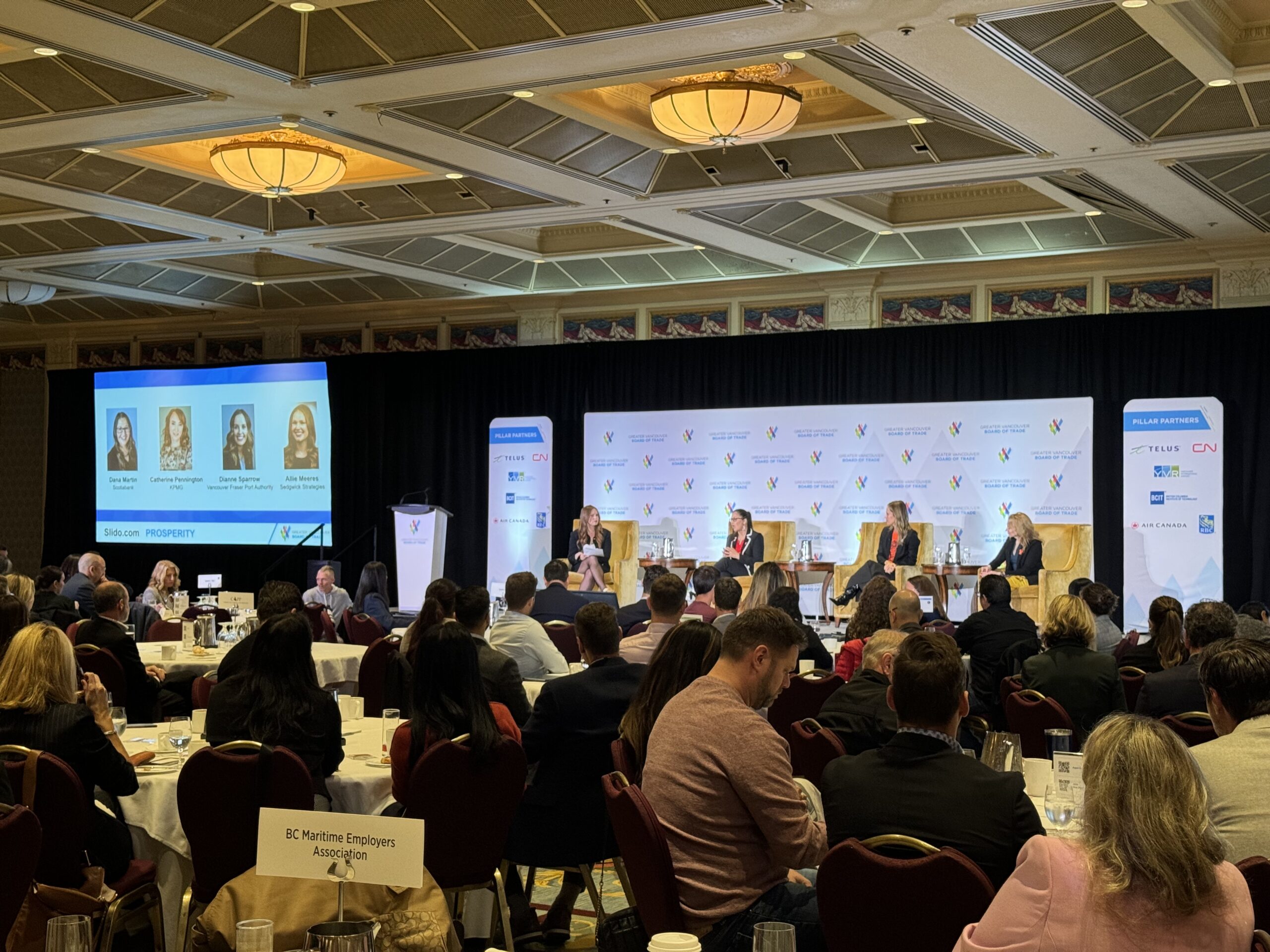The 14th annual Indigenous Opportunities Forum, hosted by the Greater Vancouver Board of Trade, brought together Indigenous leaders and the business community to discuss how we can work together to foster shared growth and reconciliation in the region.
At Spur Communication, we are committed to unlearning and relearning how to decolonize the delivery of our services, which is why attending this event was crucial. It offered a meaningful opportunity to reflect on how we can support Indigenous-led initiatives and integrate these lessons into our work. Below are some key takeaways from the event.

memorable moments & takeaways
-
Economic self-determination is key to prosperity
Chief Crystal Smith of the Haisla Nation delivered a powerful keynote about Indigenous communities shaping their own economic futures. “Economic self-determination means Indigenous communities decide what industries and resources they will use and how they will use them. This is what we want for our people,” she said. For the Haisla Nation, projects like Cedar LNG, the first Indigenous-owned LNG project in the world, are crucial in supporting the community’s future — funding everything from education for youth to elder care.
-
Economic reconciliation is foundational to other issues of justice and safety
Chief Smith also highlighted the importance of economic reconciliation, noting it allows Indigenous communities to “change the course of history on our own terms” and move from “managing poverty to managing prosperity.” The message was clear: economic opportunities for Indigenous peoples uplift entire communities, fostering safer environments, especially for women, girls, and Two-Spirit people. It is important that people don’t have to travel far beyond their communities to seek a secure future for themselves. It was a profound moment when Chief Smith described the opportunities she had on reserve as a ten-year-old girl compared with the opportunities she can now see for her grandchildren. And this shift has ripple effects far beyond that community. As Chief Smith put it, “When Indigenous people prosper, all Canadians prosper.”
-
Building bridges requires emotional intelligence
Stephen Lee from Musqueam Capital Corporation shared that corporate leaders looking to build partnerships with Indigenous nations should focus on their “corporate EQ.” He emphasized the wisdom of the Musqueam priorities of friendship, relationship, and partnership. This relational approach, grounded in mutual respect and understanding, is critical to fostering trust.
-
Land back: a win-win for all communities
A strong theme throughout the forum was the role of Indigenous-led land acquisition and development in benefiting both Indigenous nations and surrounding communities. Graham Wood of Waters Developments posed an important question: “How can people bring thousands and thousands of years of stewardship into urban development?” The answer lies in collaborative, respectful land management where everyone prospers.
-
Trust is a two-way street
In answer to the question, “How do you earn the trust of Indigenous partners?,” Dana Martin, VP of Indigenous Financial Services at Scotiabank challenged businesses to ask themselves: “Do you trust Indigenous people? And how are you showing that?” This provocation serves as a reminder that building trust must be a reciprocal process. Before asking Indigenous communities for their trust, business leaders must demonstrate it first through their actions – and put in the time required to get there.
-
Beware the use of templated approaches
Catherine Pennington from KPMG warned against the corporate tendency to rely on templated models in building relationships with Indigenous communities. While efficiency is often a plus, using templates can turn relationship-driven experiences into transactional ones. “We need to be prepared to put templates down for the sake of trust,” Pennington advised. This will be a tough one for us at Spur, since we know how helpful it can be to provide and work from templates with our clients. But your point is well-taken, Catherine! Truly de-colonizing our work sometimes means putting down our favourite tools.
-
Truth & Reconciliation requires organizational accountability
Dana Martin also stressed the importance of developing and implementing Truth and Reconciliation action plans within organizations. Indigenous employees should be consulted, but the responsibility of executing these plans must be shared across the organization. Non-Indigenous staff, in particular, must step up to carry the work. We’ll be taking this to heart, at Spur as we finalize our annual operation plans, including formalizing our next steps in our commitments to Truth and Reconciliation inside our firm.
from reflection to action
GVBOT’s Indigenous Opportunities Forum reinforced that reconciliation requires concrete actions, not just reflection. It’s about supporting Indigenous-led initiatives and being accountable to the communities we work with. At Spur Communication, we will seek opportunities to apply these lessons, ensuring that we walk alongside Indigenous partners and contribute meaningfully to shared prosperity.



